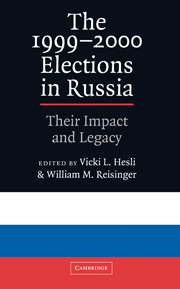Book contents
- Frontmatter
- Contents
- Contributors
- Acknowledgment
- SECTION I INTRODUCTION
- SECTION II PARTIES IN THE ELECTORATE
- SECTION III THE ROLE OF REGIONAL POWER
- 6 Elections and National Integration in Russia
- 7 The 1999 Duma Election in Russia: A Step Toward Democracy or the Elites' Game?
- SECTION IV PARTIES AND INSTITUTIONS
- SECTION V CONCLUSION
- Bibliography
- Index
7 - The 1999 Duma Election in Russia: A Step Toward Democracy or the Elites' Game?
Published online by Cambridge University Press: 23 October 2009
- Frontmatter
- Contents
- Contributors
- Acknowledgment
- SECTION I INTRODUCTION
- SECTION II PARTIES IN THE ELECTORATE
- SECTION III THE ROLE OF REGIONAL POWER
- 6 Elections and National Integration in Russia
- 7 The 1999 Duma Election in Russia: A Step Toward Democracy or the Elites' Game?
- SECTION IV PARTIES AND INSTITUTIONS
- SECTION V CONCLUSION
- Bibliography
- Index
Summary
The results of Russia's 1999 parliamentary election and the composition of the new Duma seem to contradict what scholars had been claiming over the past several years (McFaul and Fish 1996; Myagkov et al. 1997): that despite all the problems and hardships that reforms brought to the Russian people, the country's electorate remained remarkably stable. Analysis of the 1993 and 1995 Duma elections had showed that Russian voters' behavior could be relatively well explained by a unidimensional “pro-reform/against-reform” issue space (with some intrusion of nationalism) and also that the distribution of voter preferences remained relatively unchanged over the course of at least seven years. On the surface, the outcome of the latest balloting, and the resulting distribution of Duma seats, might look like a serious blow to those theories of stability. In fact, as will be shown later in this chapter, the two major political parties that were created during the 1999 election campaign period, Fatherland-All Russia (OVR) and Unity, seem to be absolutely “issue independent” and their support cannot be explained with existing theories of vote choice for the Russian setting. Their electorate is not distributed along the “urban-rural” divide, nor do they rely on reformers or antireformers. Yet, the combined voting score of OVR and Unity was about 40 percent of the total popular vote, which is about one-half of all the ballots and about 80 percent of what the “over the 5 percent threshold parties” received in 1999 altogether.
- Type
- Chapter
- Information
- The 1999–2000 Elections in RussiaTheir Impact and Legacy, pp. 142 - 160Publisher: Cambridge University PressPrint publication year: 2003
- 5
- Cited by



